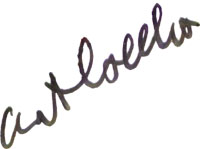 |
_small.jpg) Photo by: Linda Bensley |
 |
|
|
Art Coelho's family farm roots and hands-on heritage began in the San Joaquin Valley. This Fresno County rural experience not only gave him a deep understanding of nature, but from the Dustbowl Okie migrants and hobos who worked for his father(a Wheatville pioneer farmer in Central California)he learned the hard lessons of survival firsthand. His Portuguese grandparents emigrated from three islands in The Azores archipelago: Pico, São Jorge, and Terceira. His Azorean work is a result of "growing up Portuguese" and participating in the Holy Ghost Festas; and also from his seven pilgrimages made to the nine-island Atlantic chain starting in 1986 when he was a cultural guest of Portugal's Autonomy government there. From 1965-74, his Gypsy period, he rambled to every state except Hawaii, Alabama, and Maine. The open road led him to the Crow Reservation where in 1971 he danced at the Pierce Siding Sun Dance outside of Lodge Grass, Montana. His adopted name of Seven Buffaloes was given by his Native American mother, Marjorie Yellowtail. When Linda Hasselstrom wrote With Isolation and Great Vats of Time, in 1986, Coelho summed up her article on him: "It is better to be unknown in sagebrush and happy than to be known in neon and sad." Art is a poet, novelist, and short story writer; he has written adventure essays and journalistic articles. He is self-taught as a painter and he considers his study of the masters and his continuing field studies, which led him in 2001 to Van Gogh's Provence(St. Paul's Mausoleum at Saint Remy)to be at the heart of his work. Art's residence in Big Timber since 1975 has allowed him to widen the horizon of his Montana landscapes. His other major work focuses on world cultures themes from Africa, Europe, Asia, Polynesia, and The Mediterranean. He does portraits of people from other countries as well as those from America. His other artistic genres include nature, nudes, and satire of the social and the political arena. In 1991 he had his first one-man exhibition with To The Azores and Back Again: In Poetry & Painting. A short story of his, My First Kill, was collected in the 1994 Prentice-Hall Macmillan textbook called Fiction 100. The Pushcart Prize(1976-77)featured his killer horse poem, Like a Good Unknown Poet. His painting Morning Chore was an illustration in The Portuguese Americans, Immigrants in Agriculture. Also in 2004 a 45 minute video featured his reading and art exhibit(Walking Between Kale and Horse Beans). |
